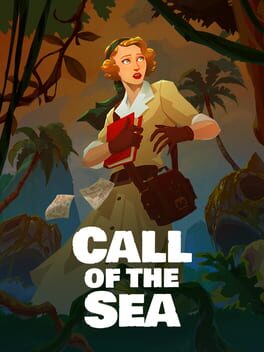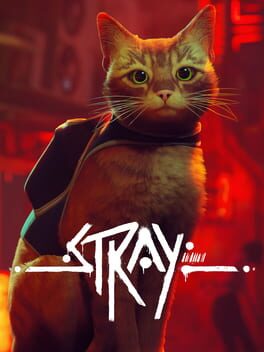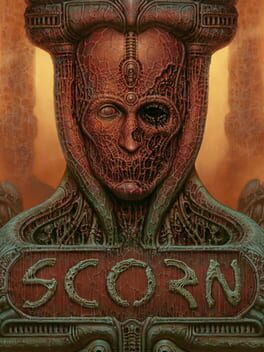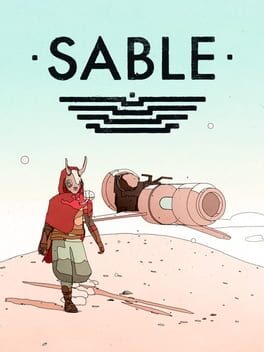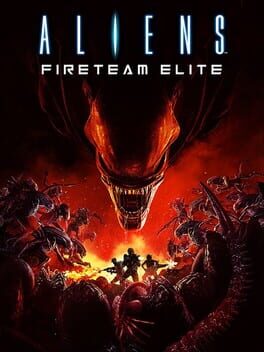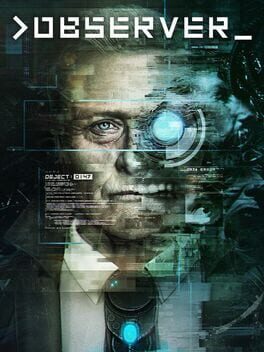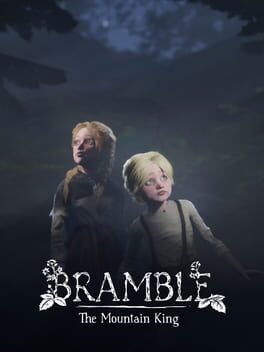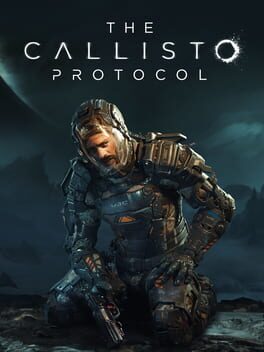Gameovah
2020
7/10
Puzzles may be somehow repetitive in their structure (explore, find notes and letters, activate the mechanism) and narratively dissonant, but what a great plot.
What a great reinterpretation of clsssic adventure novels and imageries, how original as a take on Lovecraftian mithologies, what a brilliant reflection on womanhood and monstrosity, on masculinity and discovery. How effective as a subversion of its references. And what a great love story, with a moving and thought-provoking ending.
Puzzles may be somehow repetitive in their structure (explore, find notes and letters, activate the mechanism) and narratively dissonant, but what a great plot.
What a great reinterpretation of clsssic adventure novels and imageries, how original as a take on Lovecraftian mithologies, what a brilliant reflection on womanhood and monstrosity, on masculinity and discovery. How effective as a subversion of its references. And what a great love story, with a moving and thought-provoking ending.
2022
6/10
The mechanics are not that great, I mean, just basic environmental puzzles, some small stealth sections, and exploration. Playing as a cat in a dystopian world is a great idea but nothing more: the cat is kinda stiff and the fact you can jump only where allowed (and indicated) just feels bad - I'd assume that being a cat would feel freely and dynamic and instead this cat is even more stiff than most playable humans out there.
The sci-fi dystopian worldbuilding, although not that original, is quite good and well crafted. The plot is average but its take on posthumanist fiction is funny and even moving at times.
The best aspect of the game by far is its setting, a more-walled version of Kowloon inhabited by weird creatures and robots. The structure of the city, its purpose, its technologies make it an urban embodiment of the political subtext of the game. Which may be nothing but the nth cliche, ok, but it works.
The mechanics are not that great, I mean, just basic environmental puzzles, some small stealth sections, and exploration. Playing as a cat in a dystopian world is a great idea but nothing more: the cat is kinda stiff and the fact you can jump only where allowed (and indicated) just feels bad - I'd assume that being a cat would feel freely and dynamic and instead this cat is even more stiff than most playable humans out there.
The sci-fi dystopian worldbuilding, although not that original, is quite good and well crafted. The plot is average but its take on posthumanist fiction is funny and even moving at times.
The best aspect of the game by far is its setting, a more-walled version of Kowloon inhabited by weird creatures and robots. The structure of the city, its purpose, its technologies make it an urban embodiment of the political subtext of the game. Which may be nothing but the nth cliche, ok, but it works.
This review contains spoilers
6/10
Ok, this was quite disappointing compared to its sequel (Automata).
The design philosophy is still recognisable: you must do the same boring stuff over and over, and eventually get to enjoy the meaning behind boring and repetitive stuff. In Automata, some fetch quests are explicitly self-reflexive: it's not what you do but how you experience it, you're told. In Replicant it's basically the same. But the way to get to the endings is way too punishingly boring and long. In Automata, things change a lot quite fast and you realize that the end isn't just the end quite soon. This makes the plot way more enjoyable and meaningful. Here ng and ng+ are identical. And ng++ is just striving to find all the stuff you missed beforehand. You just get a bunch of new dialogues (ng+) and a new final boss + true ending (ng++). Actually, the best ending is the ver. 1.22etc exclusive, i.e., ending E. But it's way too dramatically boring to achieve. You must replay the same 7 hours over and over, endlessly, with almost nothing new each time. This made the game almost unplayable for me: too much determination requested, and with too few (narrative, aesthetic, ludic) "rewards" along the way. It's just uselessly repetitive, there's no reason to delay the true ending that much (the ng structure in Automata makes a lot more sense. Here it makes any). In Automata, repetion is part of the very existential/theological meaning of the game. Here there's no point in repeating things.
The mix of genres is even more vibrant than in the sequel. Hack'n'slash is still its core but you also have shoot'em'up, isometric action rpg, side-scrolling adventure game, even text adventure and survival horror (!!). But: this is just not enough to make the game feel less repetitive. After the first run, it's all just smashing the same button to kill hundreds of enemies.
The plot is quite original after all, and imbued with existential themes. But it also seems rushed and fragmented. Ng and ng+ seem truncated and barely make sense. Ng++ revolves around a great design idea (you'll find something waaaaay better in Automata) but feels entirely out of place from a narrative perspective. The choice you make just doesn't make sense, considering the premises: one of the options, the most interesting one, is entirely unmotivated.
Replicant seems nothing but a draft for Automata. In case you enjoyed Automata, you'll find something interesting here as well. But it's way less powerful, refined, intelligent, and touching. As a draft cannot but be.
Ok, this was quite disappointing compared to its sequel (Automata).
The design philosophy is still recognisable: you must do the same boring stuff over and over, and eventually get to enjoy the meaning behind boring and repetitive stuff. In Automata, some fetch quests are explicitly self-reflexive: it's not what you do but how you experience it, you're told. In Replicant it's basically the same. But the way to get to the endings is way too punishingly boring and long. In Automata, things change a lot quite fast and you realize that the end isn't just the end quite soon. This makes the plot way more enjoyable and meaningful. Here ng and ng+ are identical. And ng++ is just striving to find all the stuff you missed beforehand. You just get a bunch of new dialogues (ng+) and a new final boss + true ending (ng++). Actually, the best ending is the ver. 1.22etc exclusive, i.e., ending E. But it's way too dramatically boring to achieve. You must replay the same 7 hours over and over, endlessly, with almost nothing new each time. This made the game almost unplayable for me: too much determination requested, and with too few (narrative, aesthetic, ludic) "rewards" along the way. It's just uselessly repetitive, there's no reason to delay the true ending that much (the ng structure in Automata makes a lot more sense. Here it makes any). In Automata, repetion is part of the very existential/theological meaning of the game. Here there's no point in repeating things.
The mix of genres is even more vibrant than in the sequel. Hack'n'slash is still its core but you also have shoot'em'up, isometric action rpg, side-scrolling adventure game, even text adventure and survival horror (!!). But: this is just not enough to make the game feel less repetitive. After the first run, it's all just smashing the same button to kill hundreds of enemies.
The plot is quite original after all, and imbued with existential themes. But it also seems rushed and fragmented. Ng and ng+ seem truncated and barely make sense. Ng++ revolves around a great design idea (you'll find something waaaaay better in Automata) but feels entirely out of place from a narrative perspective. The choice you make just doesn't make sense, considering the premises: one of the options, the most interesting one, is entirely unmotivated.
Replicant seems nothing but a draft for Automata. In case you enjoyed Automata, you'll find something interesting here as well. But it's way less powerful, refined, intelligent, and touching. As a draft cannot but be.
2022
7/10
Of course, I didn't understand.
But the game is so evocative and cruel, so imbued with implicit reflections on technology, cyborgs, ruination, artificial life, subjectivity and perspective, I just couldn't but enjoy it. It's so open to interpretiation I'll have to think about it. But what a great way to depict human-technology relations within a human-technology relation, i.e., digital gaming.
Of course, I didn't understand.
But the game is so evocative and cruel, so imbued with implicit reflections on technology, cyborgs, ruination, artificial life, subjectivity and perspective, I just couldn't but enjoy it. It's so open to interpretiation I'll have to think about it. But what a great way to depict human-technology relations within a human-technology relation, i.e., digital gaming.
2021
2018
2017
This review contains spoilers
7.5/10
I don't know what to say tbh. The last time I was so confused by a game after its ending was after the first Dark Souls.
I am not unsure about the qualities of the game's design of course. It's astonishing to see and overwhelming both to play and interpret:
- the level design is brilliantly dispersive;
- the creatures' behavior is just incredible (and incredibly complex - you can spend hours just watching them and striving to understand how do they work);
- most game mechanics are hidden and it's up to you to find out how to move, to interact, how things work, how the world works (I think I got only the very basics of Rain World, even after almost 20 hours of gameplay);
- the game's progression is made to make you feel completely lost - you don't know where to go, what to do, et cetera - as the small, powerless creature you are;
- you basically crawl, swipe, and run most of the time, you start to watch, to explore, to think as a prey - which is great and aid by the brilliant way the world design invites you to direct your gaze;
- it's also a very fascinating and aesthetically astonishing take on post-apocalyptic worldbuilding, many scenarios are so good you just cannot stop watching them;
- the game's narrative is more than obscure, it's the quintessence of implicit soulslike storytelling - there you have descriptions, here you have chunk of narrative you can find out by collecting items and carrying them in a specific place, to a specific character, assuming she likes you;
- the lore is deep, confusing, and overwhelming like everything else, which is great - after the first run I had the clear impression I just scratched the surface.
That said, it's so complex and deep that I need more time to think about it. I'll replay it for sure, and for sure I'll think about it for a while.
I don't know what to say tbh. The last time I was so confused by a game after its ending was after the first Dark Souls.
I am not unsure about the qualities of the game's design of course. It's astonishing to see and overwhelming both to play and interpret:
- the level design is brilliantly dispersive;
- the creatures' behavior is just incredible (and incredibly complex - you can spend hours just watching them and striving to understand how do they work);
- most game mechanics are hidden and it's up to you to find out how to move, to interact, how things work, how the world works (I think I got only the very basics of Rain World, even after almost 20 hours of gameplay);
- the game's progression is made to make you feel completely lost - you don't know where to go, what to do, et cetera - as the small, powerless creature you are;
- you basically crawl, swipe, and run most of the time, you start to watch, to explore, to think as a prey - which is great and aid by the brilliant way the world design invites you to direct your gaze;
- it's also a very fascinating and aesthetically astonishing take on post-apocalyptic worldbuilding, many scenarios are so good you just cannot stop watching them;
- the game's narrative is more than obscure, it's the quintessence of implicit soulslike storytelling - there you have descriptions, here you have chunk of narrative you can find out by collecting items and carrying them in a specific place, to a specific character, assuming she likes you;
- the lore is deep, confusing, and overwhelming like everything else, which is great - after the first run I had the clear impression I just scratched the surface.
That said, it's so complex and deep that I need more time to think about it. I'll replay it for sure, and for sure I'll think about it for a while.
2017
6.5/10
I usually don't like Bloober Team's games (I'm referring to post-Layers-of-Fear-games here) - they're usually interesting from a narrative perspective (although providing very traditional storytellings) but very, very poor for what concernse mechanics/procedures/whatever. So: bad games with a good aesthetics and (at best) acceptable narratives.
Observer makes no exception: as a detective game, it's very boring and pre-scripted (to the point most things happen even if you're not understanding what's actually going on); as a horror walking simulator, overlong and boring as usual (how could you finish Layers of Fear? How?); as a survival horror in which you run from enemies and solve puzzles, tedious or average at best. And yet the game manages to intertwine cyberpunk, psychological horror, ghotic horror, and Kafkaesque fiction in a more than brilliant way. In this sense, the representational and narrative elements of the game make it way better than the others, less tiring in its delving into clichés and archetypes, so to speak, less boring and more fascinating to explore and discover.
The game is almost entirely set in an apartment building, reminiscent of both Polanski's The Tenant and Konami's Silent Hill 4: The Room, and it mixes Kafkaesque paranoia and cyberpunk pretty well - here paranoias concern surveillance technologies, implants, the role corporations play in our existence, the increasing transformation of biological bodies into commodities. Sexual frustration is here as well, borrowed from Kafka, and it's reinterpreted towards cyberpunk as well - the game soon becomes a crawling into uterine spaces made of pipes and cables - as in Scott's Alien. Even the mixture between psychological horror, trauma fiction, and sci-fi dystopia is pretty good: through glitches, hallucinations, nightmares, and memories, you cannot but question the very fabric of the reality you act within - which may be, at the same time, a technological or a psychological construct.
Observer is still poorly designed and tedious, as every other Bloober Team's game. But at least this time it has a wordlbuilding and narrative world it's worth getting bored for.
I usually don't like Bloober Team's games (I'm referring to post-Layers-of-Fear-games here) - they're usually interesting from a narrative perspective (although providing very traditional storytellings) but very, very poor for what concernse mechanics/procedures/whatever. So: bad games with a good aesthetics and (at best) acceptable narratives.
Observer makes no exception: as a detective game, it's very boring and pre-scripted (to the point most things happen even if you're not understanding what's actually going on); as a horror walking simulator, overlong and boring as usual (how could you finish Layers of Fear? How?); as a survival horror in which you run from enemies and solve puzzles, tedious or average at best. And yet the game manages to intertwine cyberpunk, psychological horror, ghotic horror, and Kafkaesque fiction in a more than brilliant way. In this sense, the representational and narrative elements of the game make it way better than the others, less tiring in its delving into clichés and archetypes, so to speak, less boring and more fascinating to explore and discover.
The game is almost entirely set in an apartment building, reminiscent of both Polanski's The Tenant and Konami's Silent Hill 4: The Room, and it mixes Kafkaesque paranoia and cyberpunk pretty well - here paranoias concern surveillance technologies, implants, the role corporations play in our existence, the increasing transformation of biological bodies into commodities. Sexual frustration is here as well, borrowed from Kafka, and it's reinterpreted towards cyberpunk as well - the game soon becomes a crawling into uterine spaces made of pipes and cables - as in Scott's Alien. Even the mixture between psychological horror, trauma fiction, and sci-fi dystopia is pretty good: through glitches, hallucinations, nightmares, and memories, you cannot but question the very fabric of the reality you act within - which may be, at the same time, a technological or a psychological construct.
Observer is still poorly designed and tedious, as every other Bloober Team's game. But at least this time it has a wordlbuilding and narrative world it's worth getting bored for.
2023
5.5/10
Some good mechanics and a quite original (?) game flow don't make a good game, I guess.
Shifting between worlds and worlds-within-worlds is great. But that's it?
It's boring and pointless, and its aesthetics is intriguing but nothing more. I just finshed it and I am alread forgetting these 3 hours.
Some good mechanics and a quite original (?) game flow don't make a good game, I guess.
Shifting between worlds and worlds-within-worlds is great. But that's it?
It's boring and pointless, and its aesthetics is intriguing but nothing more. I just finshed it and I am alread forgetting these 3 hours.
2023
2020
6.5/10
Glitches and alleged unplayability aside, the game is (design wise) a pretty interesting attempt at merging immersive sim, open world, and rpg mechanics. Just like TW3, it doesn't work at all: as an immersive sim, it's far too easy and can be mastered without experimenting with different approaches or strategies; as an open world, it has very good subplots and characters but it's imbued with ludonarrative dissonances that make it very hard to feel immersed; as a rpg, just like TW3, it's far too similar to an action movie - every quest, being it primary or secondary (not to mention the other activities) ends up in killing dozens of enemies, making stuff explode, and so on and so forth. You just cannot choose to avoid violence. It is also basically impossible to roleplay here: V has their own voice, feelings, and choices (and you are not even controlling them, at time you just switch your playable character without any reason or narrative coherence). Also, V's growth and improvements only revolve around killing or hacking stuff.
Just like TW3 (I cannot but repeat it: people went crazy for that game, which instead has almost the exact same flaws as this one), it is also rather fragile for what concerns its narrative: it's full of plot holes you just can't ignore, characters act and react haphazardly all the time, V changes their mind from beginning to end without telling you, Silverhand is basically bipolar.
Just like TW3, to appreciate Cyberpunk 2077 you must take, understand, and play it as pure playable worldbuilding. And the game is just brilliant at building a huge and multifaceted cyberpunk world. All the cyberpunk themes, aesthetics, tropes, and archetypes you can think of are there, wonderfully merged. It's basically a playable hyper-capitalistic dystopia, a nightmare in which you cannot but perceive reality as an artifact (and in facts when your system malfunctions the world as a whole glitches), yourself as a technology, and society as a byproduct of economy and exploitation. Plots and subplots may be dissonant and conflictual but they so brilliantly and effectively address the main philosophy of cyberpunk you just cannot but fall in love with them.
Cyberpunk 2077 is not a good piece of interactive fiction. It's neither a good game nor a good piece of narrative. And yet it's a playable compendium of cyberpunk imageries. Which is great. Just like TW3 was a great compendium of dark medieval fantasy.
Glitches and alleged unplayability aside, the game is (design wise) a pretty interesting attempt at merging immersive sim, open world, and rpg mechanics. Just like TW3, it doesn't work at all: as an immersive sim, it's far too easy and can be mastered without experimenting with different approaches or strategies; as an open world, it has very good subplots and characters but it's imbued with ludonarrative dissonances that make it very hard to feel immersed; as a rpg, just like TW3, it's far too similar to an action movie - every quest, being it primary or secondary (not to mention the other activities) ends up in killing dozens of enemies, making stuff explode, and so on and so forth. You just cannot choose to avoid violence. It is also basically impossible to roleplay here: V has their own voice, feelings, and choices (and you are not even controlling them, at time you just switch your playable character without any reason or narrative coherence). Also, V's growth and improvements only revolve around killing or hacking stuff.
Just like TW3 (I cannot but repeat it: people went crazy for that game, which instead has almost the exact same flaws as this one), it is also rather fragile for what concerns its narrative: it's full of plot holes you just can't ignore, characters act and react haphazardly all the time, V changes their mind from beginning to end without telling you, Silverhand is basically bipolar.
Just like TW3, to appreciate Cyberpunk 2077 you must take, understand, and play it as pure playable worldbuilding. And the game is just brilliant at building a huge and multifaceted cyberpunk world. All the cyberpunk themes, aesthetics, tropes, and archetypes you can think of are there, wonderfully merged. It's basically a playable hyper-capitalistic dystopia, a nightmare in which you cannot but perceive reality as an artifact (and in facts when your system malfunctions the world as a whole glitches), yourself as a technology, and society as a byproduct of economy and exploitation. Plots and subplots may be dissonant and conflictual but they so brilliantly and effectively address the main philosophy of cyberpunk you just cannot but fall in love with them.
Cyberpunk 2077 is not a good piece of interactive fiction. It's neither a good game nor a good piece of narrative. And yet it's a playable compendium of cyberpunk imageries. Which is great. Just like TW3 was a great compendium of dark medieval fantasy.
6.5/10
The first was emptier, with less and less things to do, only a map to explore and a few ways to approach exploration - it approached its sandbox/open-world hybrid through subtraction, resulting in a brilliantly subversive game flow. This is denser, full of things to do, with three overlapped maps to explore, a lot of skills to use - it approaches exploration through puzzle mechanics, and it mixes sandbox and open world in a powerful, creative, and very playful way.
The first was sadder and almost hopeless, with the ghosts of your friends surrounding you from beginning to end, a world full of ruins and evidences of your failures, and a ghostly princess to save from the past - it was powerfully grim and surprisingly tragic. This one instead is much more hopeful, much more traditional in its approach to power fantasy and epic.
In the first one, the world was deserted, defeated, and you poetically traversed it alone with your memories. Here the world is full of things to do, the past is lively, there are characters everywhere, the future is yet to conquer and evil can be defeated once more.
Of course it is masterfully designed and it has some great puzzles and dungeon. But its approach to storytelling is a step back compared to the previous one - too traditional and imbued with fantasy tropes. Its approach to gameplay follows a similar lead: too many mechanics, too many things to do, too many ways to approach the world that surrounds you. The best thing of Breath of the Wild was its minimalism. Here you have rather the opposite.
And in fact I spent 200+ hours with the first one and less than 20 with this.
The first was emptier, with less and less things to do, only a map to explore and a few ways to approach exploration - it approached its sandbox/open-world hybrid through subtraction, resulting in a brilliantly subversive game flow. This is denser, full of things to do, with three overlapped maps to explore, a lot of skills to use - it approaches exploration through puzzle mechanics, and it mixes sandbox and open world in a powerful, creative, and very playful way.
The first was sadder and almost hopeless, with the ghosts of your friends surrounding you from beginning to end, a world full of ruins and evidences of your failures, and a ghostly princess to save from the past - it was powerfully grim and surprisingly tragic. This one instead is much more hopeful, much more traditional in its approach to power fantasy and epic.
In the first one, the world was deserted, defeated, and you poetically traversed it alone with your memories. Here the world is full of things to do, the past is lively, there are characters everywhere, the future is yet to conquer and evil can be defeated once more.
Of course it is masterfully designed and it has some great puzzles and dungeon. But its approach to storytelling is a step back compared to the previous one - too traditional and imbued with fantasy tropes. Its approach to gameplay follows a similar lead: too many mechanics, too many things to do, too many ways to approach the world that surrounds you. The best thing of Breath of the Wild was its minimalism. Here you have rather the opposite.
And in fact I spent 200+ hours with the first one and less than 20 with this.
